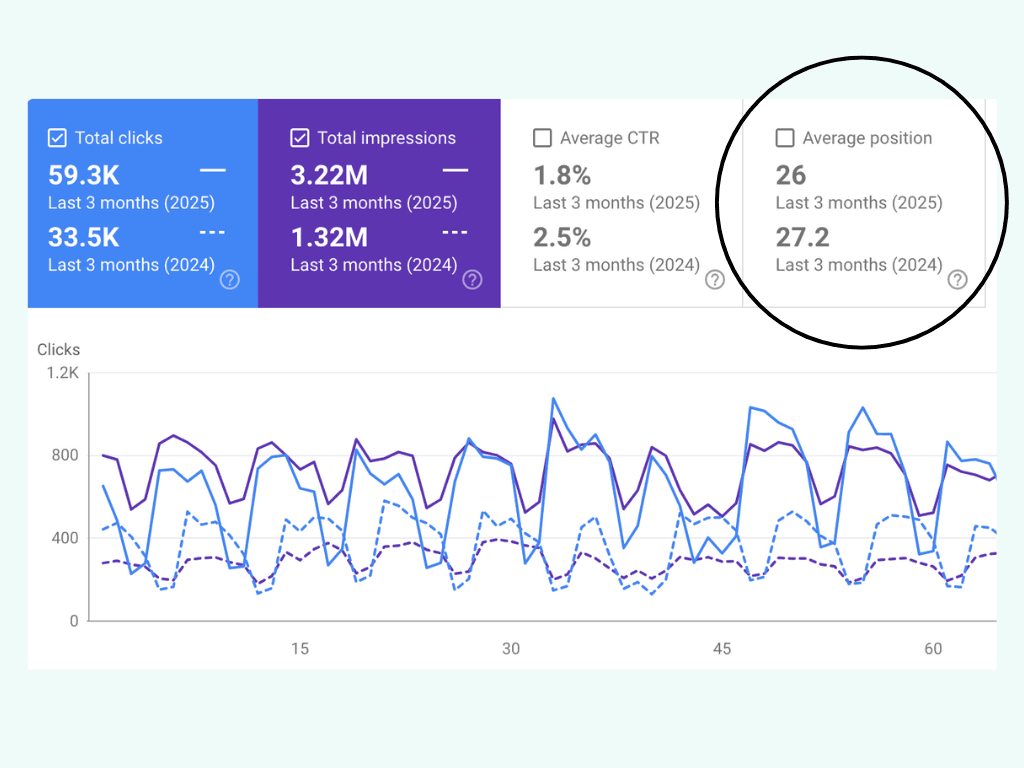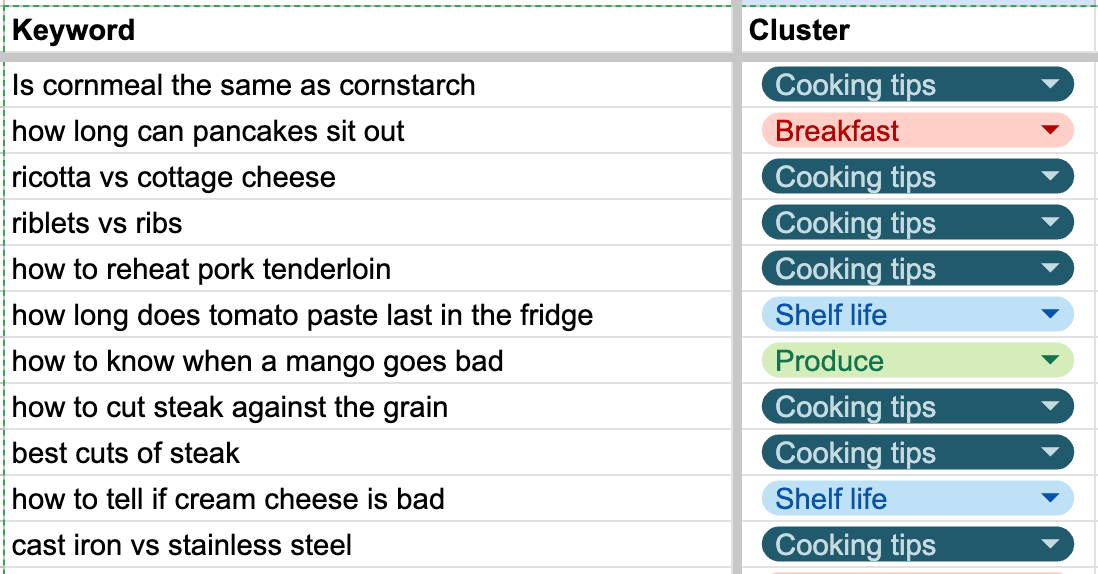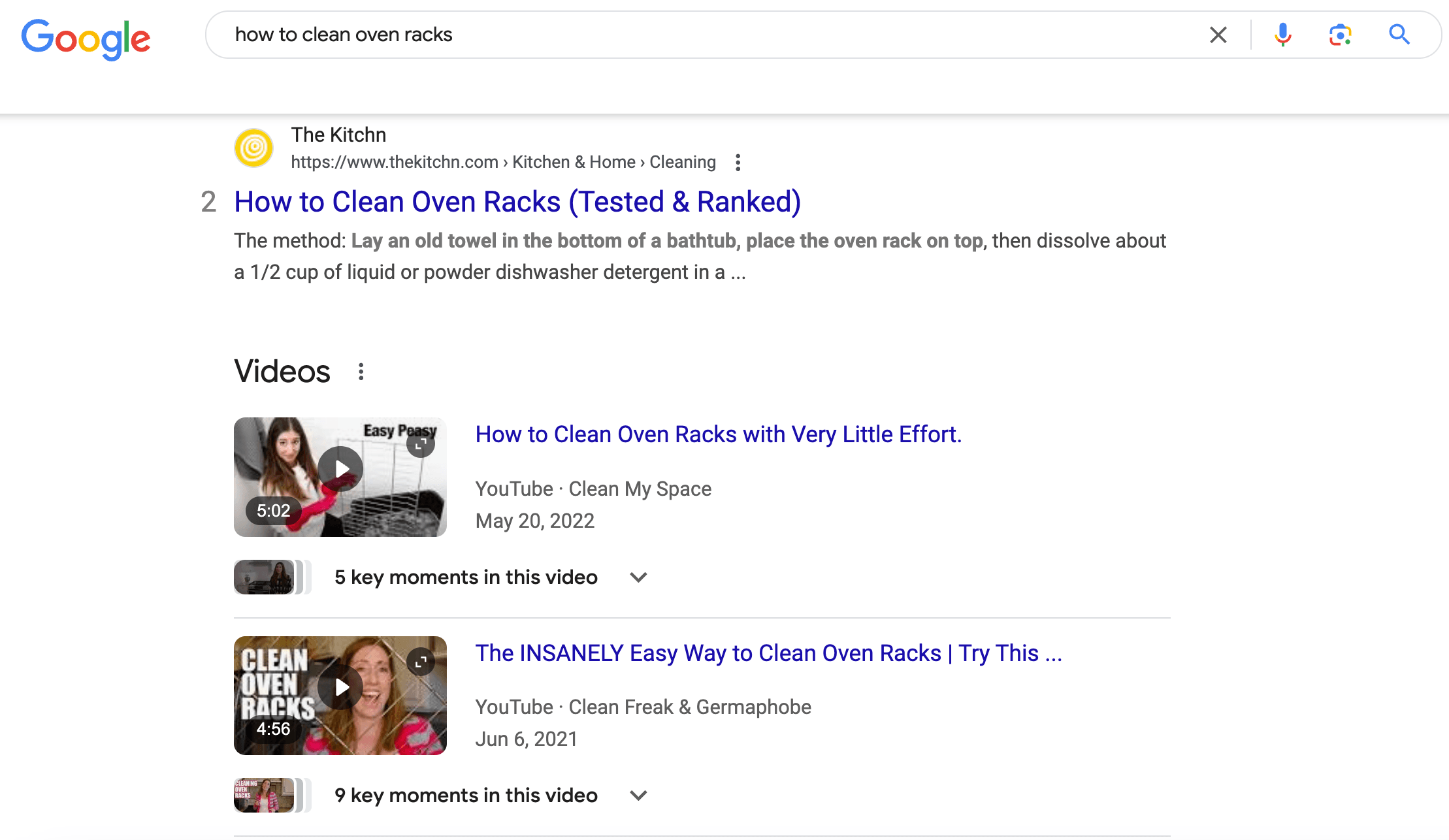Copyright © 2023 Alyssa Corso. All rights reserved.
SEO for Startups: The Ultimate Guide

Startups oftentimes need to develop cost-efficient growth strategies and keep Customer Acquisition Costs (CAC) low. SEO helps build a defensible marketing strategy while raising brand awareness.
Some startups shy away from SEO because they lack resources and have a low domain authority before getting started.
I’ve developed multiple SEO strategies for startups with little to no organic SEO strategy while building traffic and authority in highly competitive niches like healthcare.
This guide will walk you through everything you need to know to create an effective SEO strategy for startups.
👋 Hi, I’m Alyssa Corso. I have 6+ years of healthcare SEO experience working with brands like K Health, Nourish, and Joon. I help companies build lean, effective, SEO strategies from the ground up. Want to chat? Book a call.
Why SEO Matters for Startups
Startups often operate with limited resources, making SEO a valuable channel to maximize growth without breaking the bank.
Here’s why SEO could be worth investing in:
Cost-Effective Marketing Channel
SEO drives organic traffic without the ongoing expense of paid ads.
While some expenses are associated with SEO (writers, editors, an SEO consultant or agency, etc.), the long-term costs far outweigh the return on investment (ROI).
Easily Scalable
A well-executed SEO strategy grows with your business, delivering long-term results. With the right resources and team, it's easily scalable.
Increases Credibility
High search engine rankings help build trust and authority with potential customers. A strong SEO strategy can give your business a credibility advantage over competitors who are not investing in SEO.
Supports Lead Generation
SEO attracts users who are actively searching for solutions to their problems, making them more likely to engage with your business.
By targeting relevant keywords and optimizing your content, your website can potentially be a solution for what your users are looking for.
Can Support Lowering CAC
SEO can help lower CAC by reducing reliance on paid ads, especially if your business currently invests heavily in PPC for traffic and conversions.
A strong SEO strategy can drive organic traffic, meet KPIs, and optimize budget allocation by lowering costs per click.
Firstpage Sage conducted a study and found CAC from organic channels is about 42.8% cheaper compared to paid channels.
Supports Brand Awareness
SEO helps increase your brand's visibility by your business appearing prominently in search engine results.
When your website consistently ranks high for relevant searches, more potential customers become aware of your brand, even if they don’t convert immediately.
Over time, this exposure builds recognition and trust, positioning your brand as a leader in its industry.
Supports Lifecycle Marketing
SEO supports lifecycle marketing by delivering tailored content to users at different stages of their buyer’s journey, from awareness to conversion and retention.
Ongoing SEO efforts also help maintain engagement with existing customers.
Understanding SEO Basics
To build a strong foundation, startups, and any other type of business, need to understand the three core components of SEO:
1. On-Page SEO
On-page SEO focuses on optimizing elements within your website to improve search rankings.
Keywords: Research and integrate high-impact keywords relevant to your business.
Meta Tags: Meta titles and descriptions help search engines know what the page is about.
Content Quality: Publish valuable, user-focused content that answers questions and solves problems. Your content should also align with the search intent.
Internal Linking: Add internal links to related pages to improve site navigation and distribute authority. 💡Tip: Use relevant anchor text that aligns with the target keyword of the page you are linking.
2. Off-Page SEO
Off-page SEO happens outside your website to improve its authority and reputation.
Backlinks: Earn high-quality links from authoritative websites to boost your domain’s credibility. 💡Tip: Use a tool like Qwoted and submit relevant pitches to journalists and earn organic backlinks. You can even get started for free.
Social Signals: Leverage social media to promote content and increase brand awareness.
Guest Posting: Contribute articles to industry blogs to expand your reach.
3. Technical SEO
Technical SEO involves optimizing your website so that search engines can effectively crawl and index it, laying the foundation for strong search visibility.
💡Tip: If you have limited time and resources, don’t over-index on technical SEO. Focus on making sure your content is crawled, indexed, and mobile-friendly. Other optimizations can likely wait! If you’re not sure, reach out to a startup SEO consultant.
Site Speed: Improve loading times for better user experience and rankings.
Mobile-Friendliness: Ensure your website is responsive and performs well on all devices.
Structured Data: Use schema markup to help search engines understand your content.
Secure Website: Implement HTTPS for a secure and trustworthy user experience.
How to Develop an SEO Strategy for Startups: Step-by-Step
1. Define Your Goals and KPIs
Start by identifying what you want to achieve with SEO.
Common goals include:
Driving website traffic.
Increasing product sign-ups.
Boosting brand awareness.
Once you’ve defined your goals, you can set Key Performance Indicators that support and help measure your success.
Here are the KPIs I typically suggest to clients alongside a goal that might align with them:
Monthly Unique Visits
Tracking monthly unique visits helps to provide a holistic view of your site traffic. Just know that if you just started investing in an SEO strategy, you might not see much traction immediately.
Tracking the unique visits vs visits overall helps to filter out visits from people who frequently visit your website (think team members, existing customers, etc).
Goal: Increase monthly organic traffic by 15%.
Conversions
Before setting a conversion goal, it’s important to define what conversion looks like for your company and how you want to achieve it through SEO.
For example, perhaps a conversion is when a user fills out a form.
What percentage of organic website visits do you want to reach that step? And how will you get there?
You can track conversions through organic search using UTM parameters or event tracking in Google Analytics.
Goal: Increase monthly organic search conversions by 12%.
Domain Authority
Domain or website authority is a search engine ranking score developed by various SEO tools, such as Moz, Ahrefs, and SEMRush. Each tool uses metrics based on the number of backlinks, referring domains, traffic, and other factors.
It can be helpful to track domain authority using your tool of choice to understand how your website compares to competitors.
You can increase domain authority by:
- Publishing high-quality content
- Earning backlinks from authoritative websites
- Consistently update content
- Prioritize EEAT (Experience, Expertise, Authoritativeness, and Trust)
Goal: Increase domain authority from 30 → 36 in 3 months.
Improve Average Rank
Your average rank measures the average ranking of your website’s pages for a set of keywords.
If your average rank is high, you might want to consider setting a goal to lower it by optimizing your content further, as it can indicate that your content isn’t ranking very well overall.
You can find your average rank or position in Google Search Console.

Goal: Decrease average rank from 20 → 14 in 6 months.
2. Establish Topic Clusters
Topic clusters are groups of content that cover a broader subject area.
To understand what topic clusters to go after, make a list of what you want your company to be seen as the subject matter expert. From there, break down the list into smaller categories.
For example, if you want to be a subject matter expert in the B2B insurance space, your topic clusters might look like:
- Claims and legal issues
- Cost saving strategies
- Risk management
- Insurance needs and education
Creating and executing topic clusters will help your site build topical authority, and attract the audience that’s most valuable to your business.
Here's how I create a simple keyword research strategy while assigning each keyword to a topic cluster:

3. Conduct Keyword Research
Keyword research helps you identify the terms your target audience is searching for. Use tools like Ahrefs or SEMrush to:
- Find high-volume, low-competition keywords.
- Identify long-tail keywords that capture specific user intent.
- Group keywords by relevance to your business.
Understanding Search Intent
Many startups go wrong when they choose keywords and develop content without considering search intent.
Search intent is the reason a user types a query into a search engine.
There are four main types of search intent:
Navigational intent: The user wants to get to a specific website or location. For example, a user might search for "[Company] login" or "[Company] tutorial".
Informational intent: The user wants to learn something, such as answer a question or solve a problem. For example, a user might search for "how to" or "what is".
Commercial intent: The user is considering making a purchase but still needs to research options. For example, a user might search for "[company] vs [company]" or "Top [company] for [problem]".
Transactional intent: The user is ready to make a purchase, sign up for a service, or download a resource. For example, a user might search for "sign-up for [Company]".
Here's an example of informational intent:
How to Know If a Keyword Is Worth Pursuing
When you’re looking for keywords, consider the following questions to know whether it’s worth creating content for:
Where in the marketing funnel is this user? Would they be interested in reading, purchasing, or learning more about my product?
What is the keyword difficulty? Should I produce content once I have more topical authority around this topic?
Does the keyword volume align with my traffic goals?
Do I have the resources to produce a helpful piece of content on this topic?
4. Create a Content Plan
Now that you have your topic clusters and keywords, you’re ready to make a content plan. Based on keyword intent, you’ll probably create two types of content:
Blog posts, for keywords with informational or commercial intent.
Landing pages, for keywords with transactional or navigational intent.
To create a plan, you should analyze your resources and budget before getting started.
From there, here’s what you should do:
Create detailed content briefs so your writers understand what to cover in an article.
Set a goal for how many articles or pages you want to create based on your goals.
Once your traffic begins to increase, you can use the context on growth to know how many pages you’ll need to create to reach your goals.
5. Understand SEO Content Structure
Before publishing your article, make sure your pages are structured properly using header tags.
HTML header differentiates the headings (H1) and sub-headings (H2-H6) of a page from the rest of the content. Headings help search engines understand the content on the page using a hierarchical system and provide a positive user experience.
Important: You should only have one H1 on your page: the title!
Example SEO content structure:
H1: How to Make Cookies
H2: Are Cookies Hard to Make?
H2: Step-by-Step on How to Make Cookies
H3: Prepare Ingredients
H3: Make the Dough
H3: Bake for 10 Minutes
H2: Conclusion
6. Monitor and Adjust
Even though it might take some time to significant increases in rankings and traffic, you should monitor your KPIs and adjust your strategy accordingly.
If you notice your site takes longer to rank for content within a specific topic cluster, consider creating more content within the cluster to increase your topical authority and support your content.
Important: Give your content time to rank, and don’t update it too frequently (wait between 4-6 months before updating it).
Use analytics tools to track your progress and refine your strategy:
Google Analytics: Measure traffic, conversions, and user behavior.
Google Search Console: Monitor keyword rankings and fix technical issues.
SEO Tools: Track keyword positions and competitor performance. I recommend Ahrefs and SEOGets (affiliate).
Should Startups Build Backlinks?
There’s no question that backlinks are an important part of SEO.
However, I’ve developed successful SEO strategies for multiple startups without investing in backlinks.
Here’s why:
If you create high-quality, resourceful content and follow the tips I’ve outlined in this article, you will notice your content starting to rank.
Startups are typically just starting with SEO and have limited resources. Therefore, I advise companies to invest in content in the beginning and backlinks later on (in an effective and white-hat way).
SEO Challenges for Startups
When investing in SEO, there are several challenges you might come across – specifically if you’re a startup:
Limited Resources
With limited resources (time, talent, budget, etc.), it might be difficult to grow your traffic initially and rank for your keywords.
Solutions
- Focus on high-volume, low-difficulty transactional keywords.
- Ask members of your team to write articles.
- Utilize AI to create content briefs.
- Use WordPress or Webflow as a content management system (CMS) to easily upload and publish content.
Competitive Niches
If you’re in a competitive niche like health and wellness, finance, legal, or real estate, competing against larger SEO players might feel intimidating.
As someone who specializes in the healthcare niche, I understand, but there are multiple things you can do to differentiate.
Solutions
- Highlight unique value propositions and niche-specific content.
- Find keywords that focus on your audience’s problem or concern, create content that addresses it, and provide a solution.
How Do I Know If My SEO Strategy Is Working?
Here are some ways to tell if your SEO strategy is working:
Are you starting to rank on pages 2-4?
Are users engaging with your content (clicking buttons, scrolling, going to other pages)?
Are you seeing small increases in traffic month over month?
If you can answer “yes” to 2 out of 3 of those questions, you’re headed in the right direction!
If you’re not, look closely at your keywords and content quality.
Make sure your keywords have a low difficulty score (when you’re first starting) and find ways to improve your content to make it more helpful to users (add headers, remove irrelevant content, etc).
Frequently Asked Questions About Startup SEO
Why is SEO important for startups?
SEO helps startups gain organic visibility, attract potential customers, and reduce dependence on paid advertising. A strong SEO strategy builds long-term growth and brand authority.
Is SEO worth it for startups?
Yes! Unlike paid ads, which stop driving traffic once you stop spending, SEO provides sustainable, long-term growth. A well-optimized site can generate organic traffic for years, making it one of the most cost-effective growth strategies for startups.
When should a startup start focusing on SEO?
Ideally, from day one. Even if you have limited resources, setting up basic SEO foundations—such as keyword research, technical SEO, and content strategy—can prevent costly fixes later.
How long does it take a startup to see SEO results?
SEO is a long-term investment. While some improvements (like technical fixes) can show results in weeks, significant organic traffic growth often takes 3–6 months or more, depending on competition and effort.
Can startups do SEO with a limited budget?
Yes! Many SEO strategies, like optimizing existing content, improving site structure, and creating valuable blog posts, require effort but little to no budget. Free tools like Google Search Console and Google Analytics can provide key insights.
How does SEO differ for B2B vs. B2C startups?
- B2B SEO focuses on long-tail keywords, thought leadership, and lead generation through content like whitepapers and case studies.
- B2C SEO often prioritizes high-volume keywords, product pages, and engaging content that drives direct conversions.
What are common startup SEO mistakes?
Common mistakes include:
- Ignoring SEO until their competitors have dominated many of their high-value keywords
- Publishing content without a strategy
- Poor site structure
- Not tracking key metrics and adjusting accordingly
- Relying too much on paid ads instead of organic growth
Final Thoughts 💭
SEO is a powerful tool that can propel your startup to success by increasing visibility, building credibility, and driving organic traffic.
By focusing on the fundamentals, investing in high-quality content, and continually refining your strategy, you can build a strong online presence that scales with your business.


